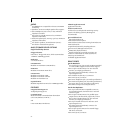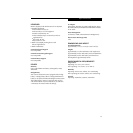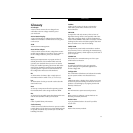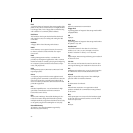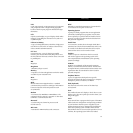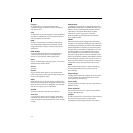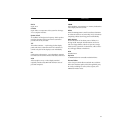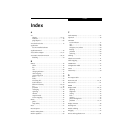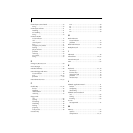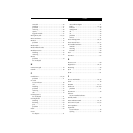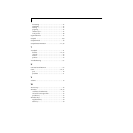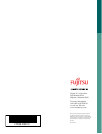
100
LifeBook S Series – Section Eight
Program
An integrated set of coded commands to your
computers telling your hardware what to do and how
and when to do it.
PS/2
An IBM series of personal computers which established
a number of standards for connecting external devices
such as keyboards and monitors.
RAM
Random Access Memory. A hardware component of
your notebook that holds binary information (both
program and data) as long as it has the proper power
applied to it.
RAM Module
A printed circuit card with memory and associated
circuitry which allows the user to add additional
memory to the computer without special tools.
Reset
The act of reloading the operating system. A reset erases
all information stored in RAM.
Restart
See Reset.
Resume
To proceed after interruption. In your notebook this
refers to returning to active operation after having been
in one of the suspension states.
ROM
Read Only Memory. A form of memory in which infor-
mation is stored by physically altering the material. Data
stored in this way can not be changed by your notebook
and does not require power to maintain it.
SDRAM
Synchronous Dynamic Random Access Memory.
Serial Port
A connection to another device through which data is
transferred one bit at a time on a single wire with any
other wires only for control of the device not for transfer
of data.
Shadow RAM
A technique of copying data or applications stored in
ROM (Read Only Memory) into RAM (Random Access
Memory) for access during actual operation. RAM is
much faster to access than ROM, however ROM
contents are not lost when power is removed.
Shadowing allows permanently stored information
to be rapidly accessed.
SMART
Self-Monitoring, Analysis and Reporting Technology
(SMART) is an emerging technology that provides near-
term failure predictions for hard drives. When SMART is
enabled the hard drive monitors pre-determined drive
attributes that are susceptible to degradation over time.
If a failure is likely to occur, SMART makes a status
report available so that the LifeBook can prompt the
user to back up the data on the drive. Naturally not all
failures are predictable. SMART predictability is limited
to those attributes which the drive can self-monitor. In
those cases where SMART can give advance warning, a
considerable amount of precious data can be saved.
SRAM
Static random access memory. A specific technology
of making RAM which does not require periodic
data refreshing.
Status Indicator
A display which reports the condition of some portion
of your hardware. On your notebook this is an LCD
screen just above the keyboard.
Stereo (audio)
A system using two channels to process sound from two
different sources.
Stroke (keyboard)
The amount of travel of a key when it is pressed from
resting to fully depressed.
Suspend
To make inoperative for a period of time. Your notebook
uses various suspension states to reduce power
consumption and prolong the charge of your battery.



